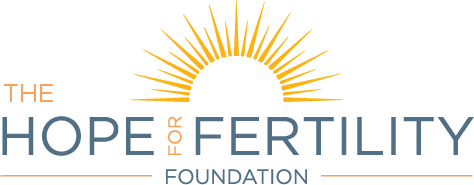About Us

Infertility can be a very tough subject for many people to talk about. It is a private matter between spouses and still is a little misunderstood and filled with assumptions. Because of this, couples often feel embarrassed and alone. As our society becomes more social and connected with people all around the world, we find that there are a lot more people out there who are facing the same challenges. This has allowed more people facing infertility to find the help they need online and we hope to be one of the resources they turn to.
The Foundation was named with two ideas in mind, hope and fertility. To keep hope when it feels like all is lost and to focus on the positive instead of the negative. The word infertility can come with so much shame and guilt, but once the journey has begun, focus on HOPE and FERTILITY. The ultimate goal is to bridge the gap between infertility to fertility.
At The Hope for Fertility Foundation, our mission is: "To provide HOPE to couples struggling in their journey to creating or expanding their families, by helping them tell their story, by spreading infertility awareness, and providing financial assistance through grants and fundraisers."
